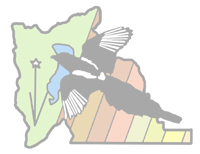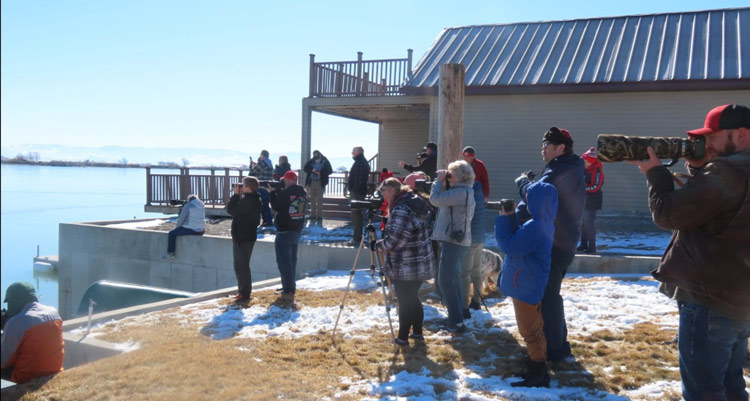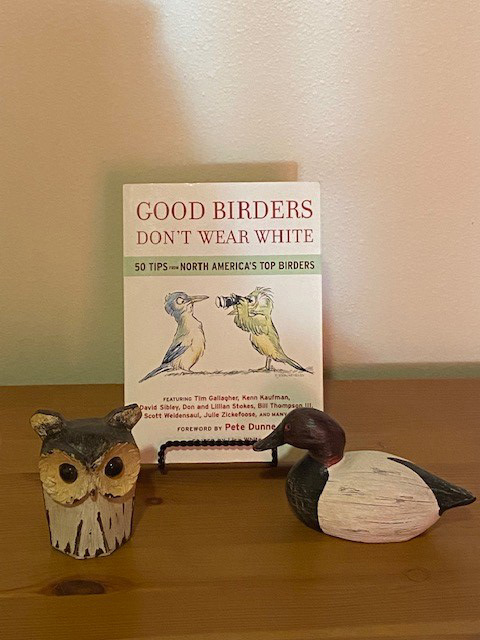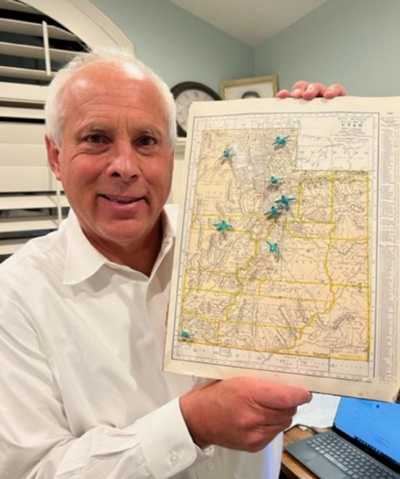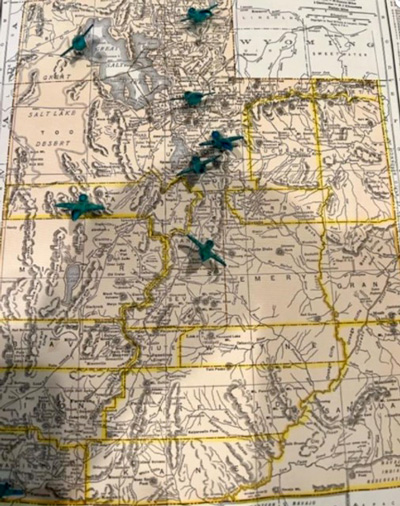|
April
2022
Contents
Monthly Meeting
Upcoming Field Trips
President's Message
2022 Birding
Challenge
Bird of the Month
Special 2022
Challenge Report
Field Trip Reports
APRIL UCB MEETING:
Thursday, April 14th at 7pm on Zoom.
As most birders know, the Great Salt Lake is a refuge for many waterfowl and
shorebird species and provides food in the form of brine shrimp and brine flies
annually for millions of birds. The lake has been recorded at its lowest levels
the last few years, and has garnered attention from many different groups and
legislative action to address the drop in water levels. Our guest speaker this
month is Ashley Kijowski, a biologist for the Utah Division of Wildlife
Resources Great Salt Lake Ecosystem Project (GSLEP). She’s going to talk to us
about the Current State of the Great Salt Lake, and what it means for the future
of the birds that call it home.
Zoom information will be sent out via the
UCBirders email list, so sign up if you'd like to
participate!
FIELD TRIPS:
(Please bring walkie talkies set to 5-0)
April 16th
2022
Tooele County fieldtrip to Clover Springs
Campground
Since it is
Easter Weekend and I didn't want to interfere with any Easter Egg Hunts so
we will meet at the Payson Walmart at 2:00 p.m. Meet to the west of the
Quick Quack carwash. If you want to meet at the campground, that would be
great too! We will try for our 22 species at the campground and if needed
drive around Rush Valley.
April 23rd 2022
We are having an "EASTER BIRD HUNT"
We will meet at the Texaco Truck Stop 5175 W. 9700 N. Elwood, Utah. We will
leave at 5:30 a.m. sharp! It will be worth it I promise! We will hunt for
birds in Box Elder County 'til we reach our 22 species. Then we will go to
Cache County and find our 22 species. Then finish our trip in Weber County
to get our 22 species. It will be a long day. Bring a lunch and snacks.
We do have a couple out of town challenge field trips planned.
The first one is:
May
20-21 2022
Grand and San Juan County
On Friday we will meet at the Swanny Ciy Park 400 N.100 W. Moab at 11 am.
Our first birding spot will be by the Kane Creek OHV parking lot. I usually see
a lot of birds here, hopefully we will get our 22 species for Grand County, if
not we will stop at the Scott S. Matheson Wetlands Preserve and around town.
Please bring snacks, a lunch and water.
Then we will head to Devil's Canyon Campground to set up camp. Or if you want
there are hotels in Monticello and Blanding. I would recommend getting
reservations ASAP.
After setting up camp we can look for birds around the campground.
Saturday we will meet at 8 or 9 am depending on the weather to look for birds
around the campground, drive to Recapture reservoir and if we have time go check
out the Blue mountains. I love this area and I am excited to share it with you
all. My favorite species down here are Acorn Woodpecker, Western Bluebird, Pygmy
Nuthatch, Grace's Warbler and hopefully Red Crossbill! I have also seen
Williamson's Sapsucker, Lewis's Woodpeckers and so many others!
Second field trip:
June 3-4 2022
Washington County
Friday we will meet at 6 am at the Bluff street McDonald's in St. George.
We will drive out to Lytle Ranch. We will spend a lot of time there. Please
bring a lunch and water. After that we will see if we have time to go to the
Gunlock area to look for Common Blackhawk, go to Snow Canyon and Tonaquint
Nature Park.
Saturday we will meet at the Hurricane Walmart at 7 am. From there we will go
straight up Kolob Terrace to Lava Point Lookout to look for California Condors.
We will walk around the area there looking for birds, then drive around to a few
other good spots.
If we have time we will check out Dalton Wash for Rufous-crowned Sparrows and
hit Grafton. Plan on lunch that day as well.
Remember to book your hotels ASAP.
On your drive down Thursday please stop in Iron County to get your 22 species.
My favorite spot is the trail along the river that goes up Cedar Canyon-Lower (aka
Canyon trail) its a ebird hotspot, i also like Canyon Park. I would think you
could find all 22 species in a few hours there.
|
|
Would you like to help
with the Utah County Birders Organization!?
We are looking for someone to fill the position of President-Elect
on our board. Any member of Utah County Birders is eligible to apply
for this position. The President-Elect would fill the role of
President of Utah County Birders next year. You don’t need to be an
experienced birder, you just need an interest in birds and be an
active member of our group. You would be on the group email for the
board officers and give help and suggestions for meetings, field
trips, activities etc. Attend meetings and field trips when
possible. Please email
if you are interested. |
|
President's Message -
April 2021
by Machelle Johnson
So far we're off to a great start for our 2022 Challenge.
The field trips have taken us to Salt Lake, Juab, Millard, Sandpete and Sevier
counties. You should already have Utah county done as well so you could be at 6
counties or more by now. We'll be adding 5+ counties in the next 3 months with
the field trips that are planned.
Going on these field trips is a great way to increase your birding knowledge and
skills. We have a such a great group of good birders that are willing to share
their expertise with us! Other ways to improve include reading books, articles
and visiting websites. Some of my favorites are
utahbirds.org,
allaboutbirds.org, various field
guides, The Essential Field Guide Companion by Peter Dunne, Field Guide to
Advanced Birding by Kenn Kaufman, and this little gem, Good Birders Don't Wear
White, by various authors.
This is a fun, quick read with lots of good information ranging from Birding
Etiquette to the Joy of Birding. I especially like the section titled "Identify
then Testify". There are many relatable birding situations and experiences that
the authors write about plus great tips and tricks for birding, and funny
stories. I highly recommend it. You can borrow my copy if you would like, just
contact me about it.
Machelle
,__,
(0,0)
/)_)
""
|
|
|
Robert Parsons off to a great start!
My daughter gave me a fun Christmas present that I thought I would share with
the group. She found a map of all the Utah counties, outlined the counties and
then mounted it on some corkboard. She gave me a box of colorful hummingbird
pins that I could stick in each county as I completed the 2022 birding
challenge. As you can see, we’ve made a good start and have eight counties
checked off. I leave this up in my office so that each day it is a fun reminder
to start planning for the next county adventure! I can
Robert
|
|
|
|
|
|
|
BIRD OF THE MONTH:
|
|
|
Bristle-thighed Curlew
(Numenius tahitiensis)
By Ned Hill
I
love shorebirds--not so much for their beauty (which is often appealing, too) as
for their sometimes long-distance seasonal travels. I know the Bristle-thighed
Curlew is not on the Checklist of Utah Birds--but Utahns sometimes visit places
where they might encounter these birds on their wintering islands, like Hawaii.
The Bristle-thighed Curlew nests in mountain meadows of northern Alaska. But
when the warm weather starts to wane, these medium-sized shorebirds travel down
to islands in the Pacific Ocean (note the "tahitiensis" in its scientific name).
These birds know how to find first-class wintering spots!
|
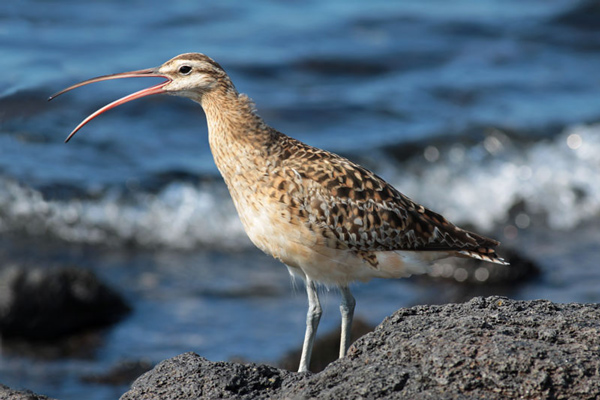
Bristle-thighed Curlew
by Margaret Sloan
©Margaret Sloan |
Their name comes from the
bristle-like feathers at the base of the legs. They have a fairly long and
strong, down-curved bill. Their wingspan is almost three feet. Their call is a
fairly loud whistle.
My first sighting of a Bristle-thighed
Curlew came in May of 1996 when Ivan Call (another Utah County Birder) and I
went on a fascinating adventure to Attu Island and other parts of Alaska. On our
short journey into Nome, we hiked some distance up into the deeply moss-covered
(and ankle twisting) mountains. We finally found a frequently used rocky meadow
where Bristle-thighs were nesting. It was a thrill to see them circle our heads
giving their loudly whistled calls.
I again encountered Bristle-thighed
Curlews a few years later, thanks to the courtesy of Les Moore, director of the
Polynesian Cultural Center in Laie, Hawaii. He drove my wife and me around the
outskirts of the golf course where we found many colorful Hawaiian birds. And,
finally, a couple of Bristle-thighed Curlews flew over us, enjoying the warm
sunshine. It then occurred to me what amazing birds these are. They had to
travel at least 3,000 miles from Nome to Laie! How do they do it? If they are
just one degree off, they would miss Hawaii by hundreds of miles--with no other
islands nearby for an alternative landing spot. And, like most migrating birds,
they can't refuel on the way. They would have no surplus energy to allow them to
"look around" for alternative destinations. It is even more amazing when you
consider that some significant percentage of the Curlews would be recent
hatchlings making the trip for their first time!
So, next time you are in Hawaii
in winter, look around for Bristle-thighed Curlews and other strong-willed
shorebirds that may have come farther than you have come to visit these
delightful Pacific Islands! And when you make decisions in life, stay pretty
close to your course because deviations may lead you far from where you hoped to
end up!
|
|
Field Trip Reports
|
|
|
|
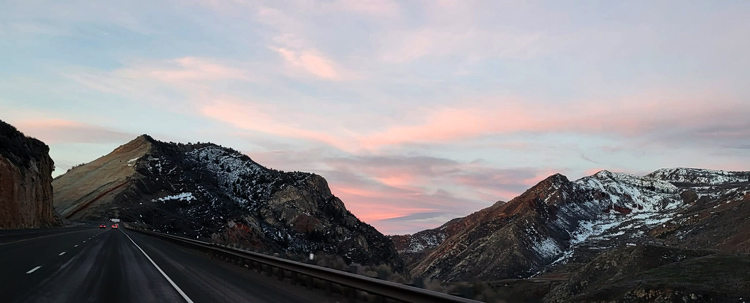
I don't get up often this early but when I do, sunrises like this make it
worth it!! |
|
Sanpete/Sevier
County Fieldtrip
26 Mar 2022
by Suzi Holt
|
We had a great turn out today for
our fieldtrip. We met at 7 am at the Chevron in Spanish Fork and got to
Fairview to meet Bryan at around 7:45 am.
|
|
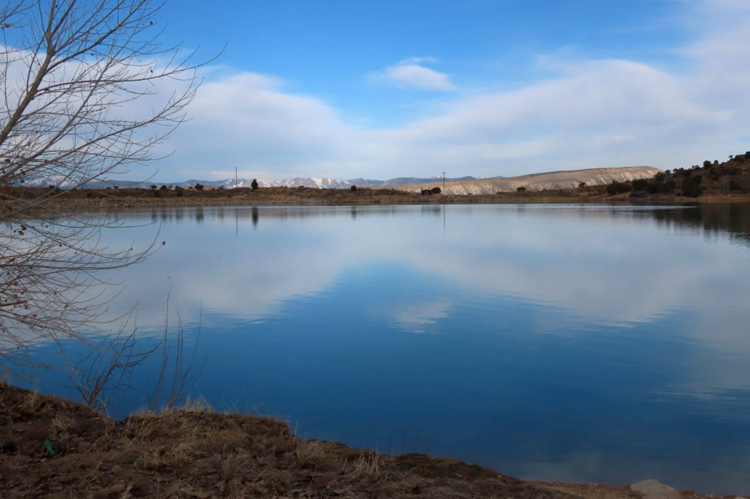
Palisades State Park
|
|

Double-crested Comorants-Palisades SP
|
|
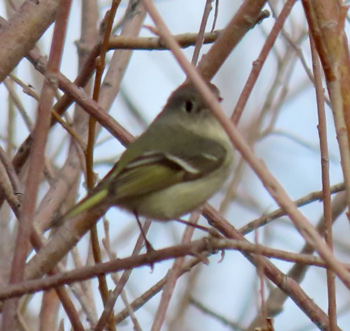
Ruby-crowned Kinglet-Palisades SP |
From there we headed to Palisades State Park. We saw lots of
Double-crested Cormorants, Canada Geese, and Common Mergansers.
Our favorite bird was a Red-breasted Merganser hanging our with the
Commons. We also had Cinnamon Teal, Gadwall, Mallards, American
Coots, Northern Shoveler, Eurasian Collared Dove, Ring-billed Gull,
California Gull, Killdeer, Northern Flicker, Black-billed Magpie,
Ruby-crowned Kinglet, Pine Siskin, American Robin, House Finch, Cassin's
Finch, Common Raven, Red-winged Blackbird, and European Starling.
Yeehaw 22 species in Sanpete county!
|
|
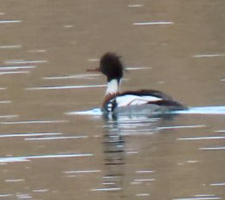
Red-breasted Merganser-Palisades SP |
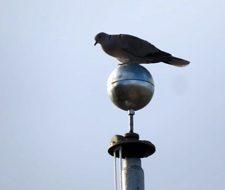
Eurasion-collard Dove-Palisades SP
|
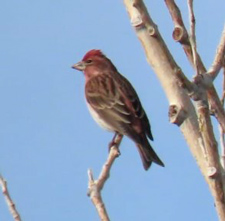
Cassin's Finch-Palisades SP |
|
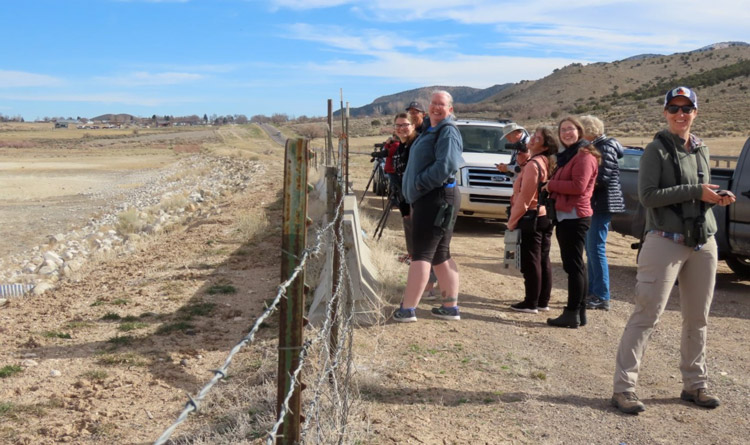
Ninemile Reservoir
|
|
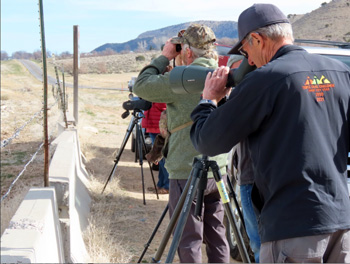
Ninemile Reservoir |
We then went to Ninemile Reservoir. There
were lots of waterfowl here! We had Canada Goose, Bufflehead, Common
Goldeneye, Northern Shoveler, Mallard, American Wigeon, Ring-necked Duck,
Gadwall, Canvasback, Green-winged Teal, Northern Pintail, Lesser Scaup,
Redhead, Common Merganser and Ruddy Duck. Had a flyover of a
Peregrine Falcon. Then we heard Chukars!! We continued looking for birds
and found a couple Eared Grebes, a Greater Yellowlegs, Killdeer
and a American Avocet, American Coot, Sandhill Crane, California Gull,
Song Sparrow, Common Raven and Western Meadowlark. Then we saw
the Chukars!!!
|
|
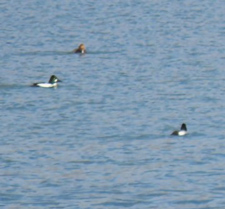
Common Goldeneye-Ninemile Reservoir |
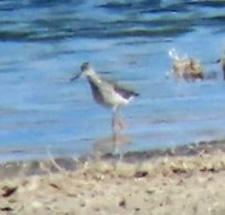
Greater Yellowlegs-Ninemile Reservoir |
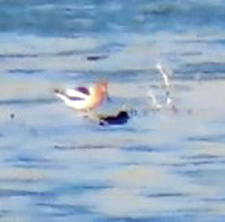
American Avocet-Ninemile Reservoir
|
As we came into Gunnison we saw FOY 18 Turkey Vultures!!! What a
morning. Pitstop at Maverik.Now onto Sevier
County. First stop Redmond Lake. Our first birds were Tree Swallows,
American Robins, American White Pelican, American Coot, Mallard, Turkey
Vulture, Sandhill Cranes, Canada Goose, Green-winged Teal, Western
Meadowlark and Yellow-rumped Warblers. We heard a
White-crowned Sparrow. Had a Northern Flicker flyover. Saw
Eurasian Collared Dove, European Starling, Red-winged Blackbird, Blackbilled
Magpie, House Sparrow,...
|
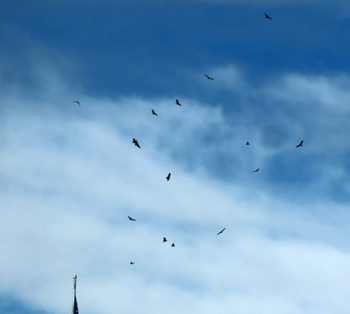
Turkey Vultures-Gunnison
|
...and then saw a FOY Swainson's Hawk!! We also saw Red-tailed
Hawk, California Gull, Clark's Crebe, Northern Shoveler, Common Merganser,
Common Raven and a flyby of a Long-billed Curlew!! |
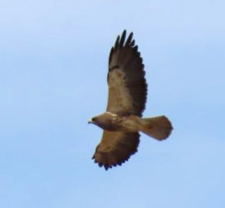
Swainson's Hawk-Redmond Lake |
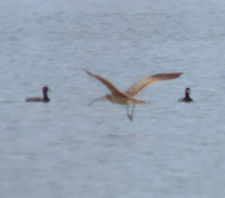
Long-billed Curlew-Redmond Lake
|
|

American White Pelicans-Redmond Lake
|
|
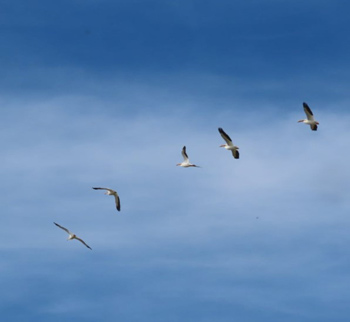
American White Pelicans-Redmond Lake |
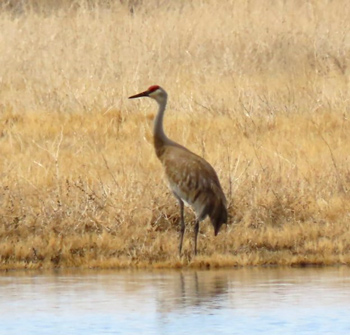
Sandhill Crane-Redmond Lake
|
|
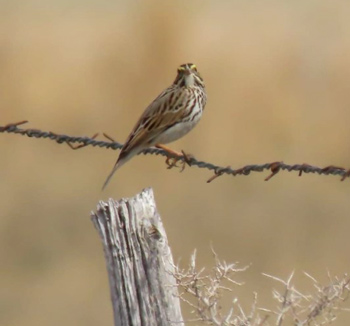
Savannah Sparrow-Fayette River Bottoms |
|
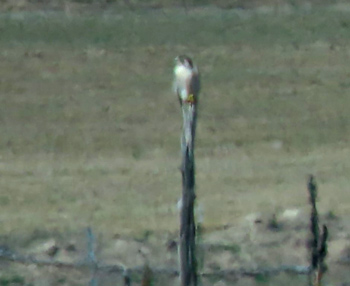
Peregrine Falcon-Fayette River Bottoms |
We then drove the Fayette Bottoms along the Sevier
River. We had a Cooper's Hawk, Great Blue Heron, American Kestrel,
the same Ameican White Pelicans, a few Savannah Sparrows, Western
Meadowlark, Northern Harrier, Horned Lark, Common Raven, Turkey Vultures,
Northern Pintail, American Coot, Northern Shoveler, Mallard, Gadwall,
Canvasback, Ring-necked Duck, Redhead and another Peregrine Falcon!!
We aslo saw a Red-taield Hawk and a Rough-legged Hawk,
Double-crested Cormorant and a Neotropic Cormorant!! We also saw
Killdeer, Sandhill Cranes, and Black-billed Magpie. Yay we got
more than our 22 species!!
Back into Sanpete County to Yuba Lake Painted Rocks SP. Lots of Canada
Geese all over the island, American Coot, American Wigeon,
Green-winged Teal, Gadwall, Redhead, Northern Shoveler and Black-necked
Stilts!! We also saw American White Pelican, Common Raven and Two
Golden Eagles!!
It was a fun trip! Total trip species 66!!
Thanks Bryan Shirley you are the best field guide out
there!!!
|
|
|
|
|
|
|
|
|
|
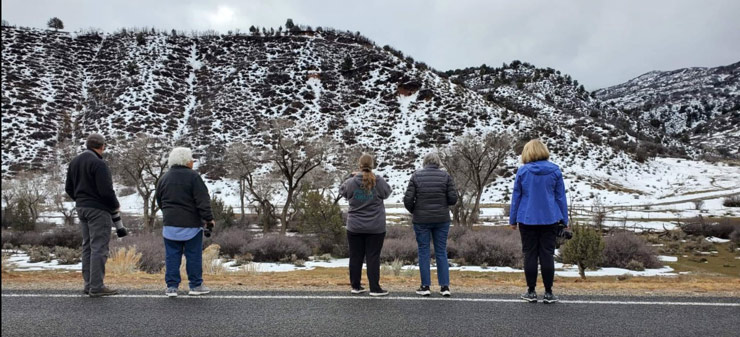
Watching the Song Sparrows
|
|
Diamond Fork Field Trip
5 Mar 2022
by Suzi Holt
|
| A
few minutes after 9 we headed up the canyon. Our first bird was a
American Kestrel. We saw a few Black-billed Magpies, and
American Robins too. At the campground our first bird was a
Belted Kingfisher. And then a couple American Dippers
dipping. We made such a fuss the campers woke up and came out to see if
we had seen a moose :) oops. We saw some more American Robins, a
Woodhouse's Scrub Jay and some European Starlings.
|
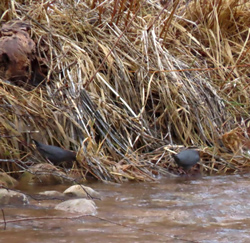
Two American
Dippers
|
|
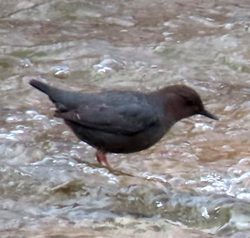
American
Dipper
|
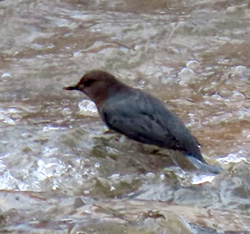
American
Dipper |
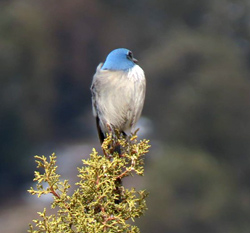
Woodhouse's
Scrub-Jay |
|
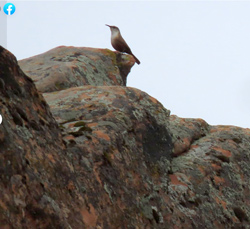
Canyon Wren |
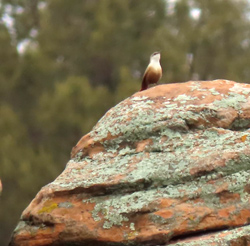
Canyon Wren |
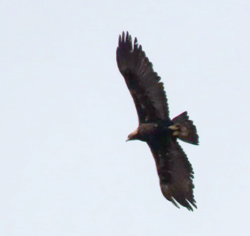
Golden Eagle |
From there we made our way up to the
Red Ledges area. We were greeted by a couple excited Canyon Wrens. We
continued upthe canyon and saw quite a few Townsend's Solitaires,
lots of Song Sparrows, a Juniper Titmouse. There were lots
more Black-billed Magpies, American Robins and Woodhouse's Scrub
Jays. On our way down we saw a Common Raven, two more Belted
Kingfishers and a couple Golden Eagles.
On the way home we stopped and saw the Lewis's Woodpeckers in Salem.
|
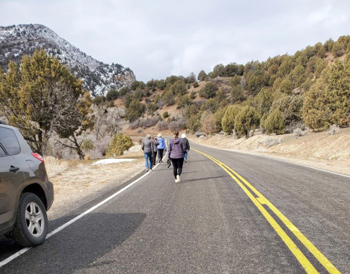
Chasing the Juniper Titmouse |
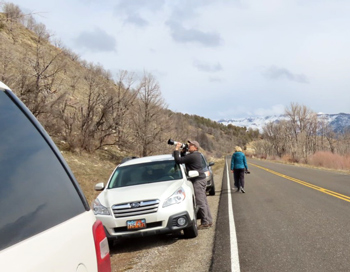
Diamond Fork Canyon Road |
|
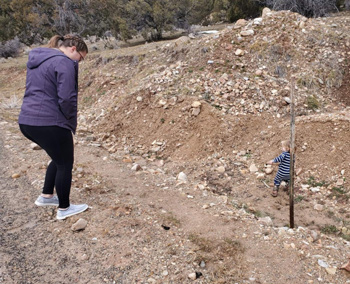
Yep Tatum is in the dirt |
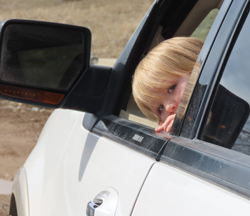
Tatum - peek-a-boo! |
|
|
|
Utah County Birders website
Utah County Birders Board Members
If you'd like to write an
article for the news newsletter...
send it to:
ucbirders@utahbirds.org
|
|
|
|
|
